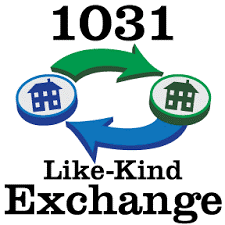1031-Like-Kind Exchanges

A 1031 exchange, also referred to as a like-kind exchange, is a means of deferring taxes by ‘swapping’ one business or investment property for another. As the IRC section 1031 (a)(1) states:
“No gain or loss shall be recognized on the exchange of property held for productive use in a trade or business or for investment if such property is exchanged solely for property of like kind which is to be held either for productive use in a trade or business or for investment.”
As of January 1, 2018, like-kind exchange rules now ONLY apply to real estate. They no longer apply to other property such as personal property. Therefore any “exchange” of personal property will be treated as a “sale”.
While this exchange can be extremely beneficial for an investor it can be complicated to navigate due to strict rules enforced by the IRS to ensure that the transaction stays within the 1031 guidelines.
There is no limit on how many times one may “exchange” their property or how frequently they can do so. It is possible for an investor to keep rolling over property, and will not have any tax implications until the property is eventually sold for cash.
The term ‘like-kind’ seems straightforward, but the types of property that qualify for an ‘equal’ exchange is fairly broad. While they do not have to be identical, for example an investor may exchange a multi-family residence for a single-family residence or an office building for a shopping center, they must adhere to the “productive use in trade or business” rule. If the property is for personal use, like your residence, then it does not qualify. Whether the personal property is used predominantly in the United States and/or personal property used predominantly outside the United States neither are like-kind properties.
Property held “primarily for sale” also cannot be exchanged, meaning if you were to purchase a home as a fixer-upper with the intent to sell it immediately after it will qualify you as a “dealer”. Partnership shares, corporate stocks, bonds, and the like are also exempt.
There is also a specific time-frame in which the transaction must take place. If an exchange does not happen simultaneously it can be delayed, which is often the case as it may not always be easy to find another property that meets the needs & wants of the investor at a similar price. A delayed exchange is handled by having a qualified intermediary who “holds” the cash from the sale and then uses it for the purchase once the replacement property is found. During this delay the IRS requires that the replacement property be identified in writing to the intermediary within 45 days from the sale of the original property. The acquisition must be completed within 180 days of the sale.
Use Form 8824: “Like-Kind Exchanges” when filing your tax return.
This just scratches the surface of 1031 exchanges and there may be other factors that could come into play depending on the particular situation. Having a knowledgeable CPA on your side to help navigate 1031 exchanges is very important.
The above information is of a general nature only and should not be relied upon for specific situations. Click here for additional tax services information.
Call Marlies Y Hendricks CPA PLLC at either 716-694-3500 or 910-769-8730 as required to set up an appointment.


